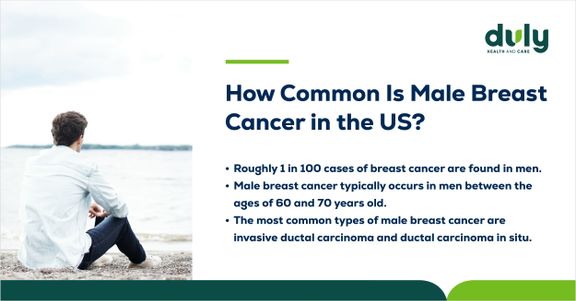Breast cancer is often thought of as only affecting women. But everyone – including men – has breast tissue. While less common, male breast cancer can occur, and because it’s not talked about as much, men may not be aware of the signs.

While breast cancer in men shares some similarities with women, there are differences to be aware of. Here’s what you should know about male breast cancer, including its symptoms, diagnosis, and treatment.
Is Male Breast Cancer the Same as Female Breast Cancer?
Breast tissue – which is made up of fat, milk ducts that carry milk to the nipples, and milk-producing glands – is something that everyone is born with.
When puberty hits, the breast tissue in people assigned female at birth grows. In people assigned male at birth, the small amount of breast tissue they have remains the same. However, because everyone has breast tissue, anyone can develop cancer in this part of the body.
Still, male breast cancer differs from female breast cancer in a few ways. To begin, it’s usually diagnosed at a later stage and is more advanced, due to conditions such as a bigger tumor size, the cancer spreading to another part of the body, or the involvement of the lymph nodes (a part of the immune system).
Men are also more likely to develop two specific kinds of breast cancer: invasive ductal carcinoma and ductal carcinoma in situ. Invasive ductal carcinoma is the most prevalent type of breast cancer in both men and women. It begins in the milk ducts (underdeveloped in men) and moves to the rest of the breast tissue. Ductal carcinoma in situ is an early form of breast cancer in which the abnormal cells haven’t moved out of the milk ducts yet. Men can also develop lobular carcinoma, which begins in the glands that produce milk.
Other types of breast cancer, including triple-negative breast cancer, are less common in men.
What Increases My Risk of Male Breast Cancer?
The exact cause of male breast cancer is unknown. However, as with female breast cancer, certain factors increase your risk of developing male breast cancer, such as:
- Getting older
- A family history of breast cancer
- Genetic mutations, such as the BRCA1 and BRCA2 genes
- Obesity
Other breast cancer risk factors are specific to men, such as:
- Hormone therapy for prostate cancer
- Klinefelter syndrome, which is when males are born with more than one copy of the X chromosome and hormones are affected
- Testicle surgery or disease, such as orchitis (inflammation of one or both testicles)
- Liver disease, which can increase estrogen levels in men
How Do I Know if I Have Male Breast Cancer?
Many women are aware of the signs of breast cancer and engage in regular screenings, like self-exams, clinical exams, and mammograms.
However, because male breast cancer is less common, some men may not be aware of the signs. This can lead to a later diagnosis, making the cancer more difficult to treat.
Men who have breast cancer typically have lumps that they can feel. Other signs of male breast cancer include:
- Swelling in the breast
- Flaking or redness of the breast skin
- Nipple discharge, bleeding, or pain
- Changes in nipple color or a turning inward of the nipple
- Dimpling of the breast skin, which can look like the skin of an orange
If you’re experiencing any of these symptoms or other concerning changes in your breasts or chest area, talk to a healthcare provider as soon as possible.
Do you have symptoms that may be related to male breast cancer? Make an appointment with the Duly Health and Care High-Risk Breast Clinic.
How Is Male Breast Cancer Diagnosed and Treated?
Diagnosing male breast cancer involves tests to examine the breast tissue. Healthcare providers will usually begin with a clinical breast exam. If needed, they will order follow-up tests, such as imaging tests (X‑ray, MRI, or ultrasound) or a biopsy (taking a small sample of breast cells for testing in a lab).
Treatment for male breast cancer is similar to treatment for female breast cancer in that it depends on the size of the tumor and how far it has spread, if at all. Male breast cancer is usually first treated with surgery, which removes some of the breast tissue (lumpectomy) or all the breast tissue (mastectomy).
Other treatment options include:
- Radiation therapy, which uses beams of energy to destroy cancer cells
- Chemotherapy, which is medication to kill cancer cells
- Hormone therapy, which is medication that stops the growth of cancer that relies on hormones for growth
- Targeted therapy, which is medication that targets certain chemicals in cancer cells, causing those cells to die
Long-Term Breast Health for Men and Women
Everyone has breast tissue, so that means everyone should take steps to reduce their risk of breast cancer or identify it early when it’s easier to treat.
For most men, this starts with family history. If multiple family members have had breast or ovarian cancer or someone in your family has a confirmed BRCA1 or BRCA2 mutation, you may benefit from genetic screening.
If you’re a transgender man and you haven’t gone through gender-affirming surgery on your chest, follow breast cancer screening guidelines for those assigned female at birth. If you have had gender-affirming surgery, breast cancer is less likely – but still possible.
No matter your situation, it’s important to remain familiar with the look and feel of your chest to detect changes and report them to a healthcare provider. By prioritizing your breast health and staying in close contact with your provider, you can reduce your chances of developing any kind of breast cancer.
Health Topics:








